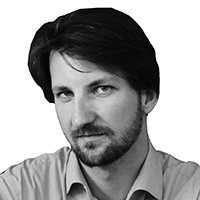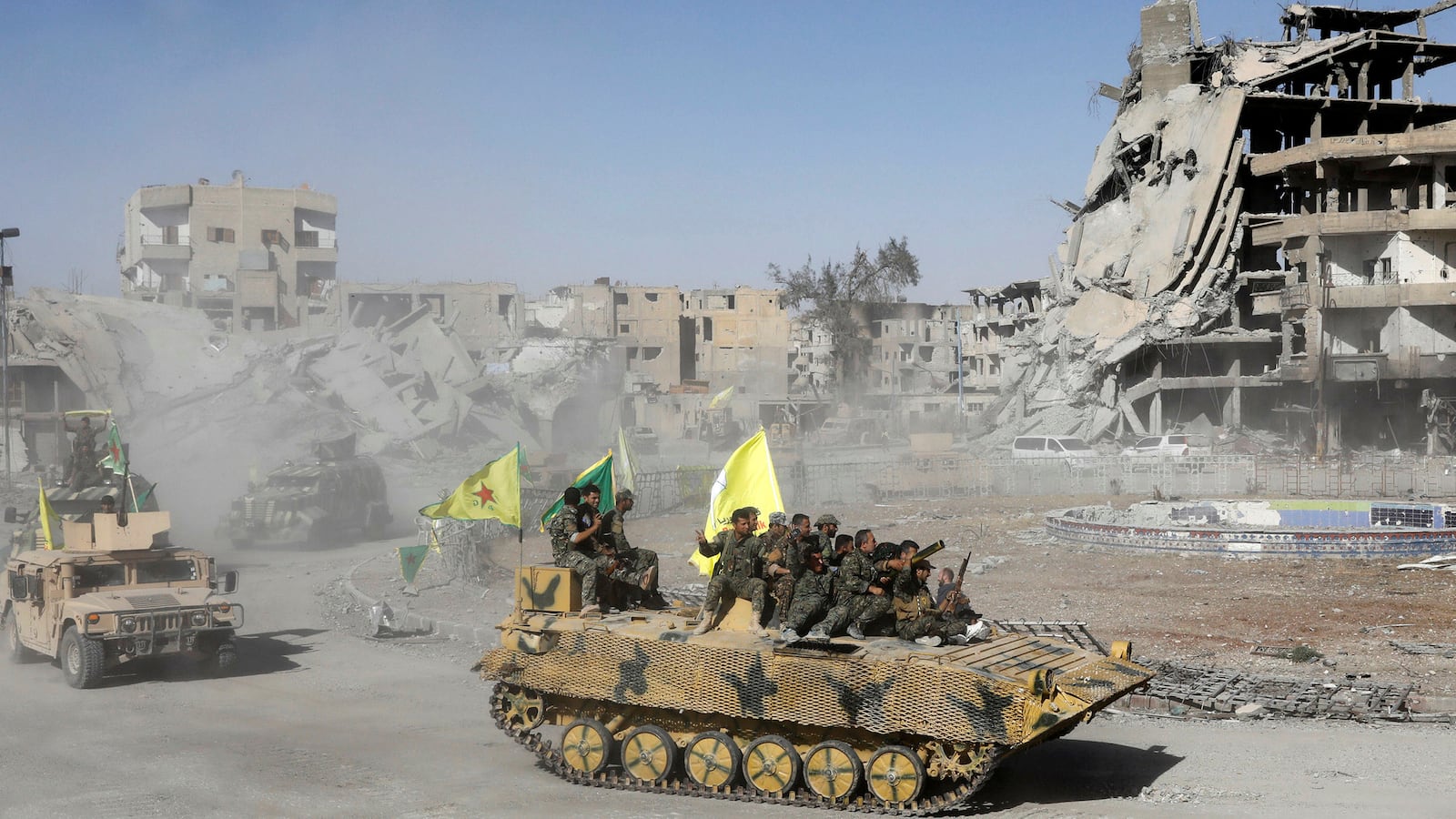RAQQA, Syria—Under a blazing sun in empty streets full of destroyed buildings, marching past the rotting bodies of terrorists once loyal to the so-called Islamic State, fighters from the U.S.-backed Syrian Democratic Forces are celebrating the defeat of ISIS, or Daesh, as they call it. Although the victorious troops were led by Kurds, many of those shouting slogans and firing into the air to celebrate Tuesday were Arabs from Raqqa who had joined the SDF to win back their city.
“Raqqa is free, free! Daesh go out,” said 20-year-old Abdullah. “We kicked them out.”
But everyone here is aware there is still much to do, including work to eliminate the last small pockets of ISIS resistance and clean out vast numbers of mines and improvised explosive devices scattered through an urban landscape devastated by thousands of American bombs supporting the SDF offensive.
After the bloody four-month campaign, the denouement was almost anticlimactic. Reporters did not see much from the last day of the fighting because, since Sunday, for reasons that are not entirely clear, we were not allowed to visit the front lines.
Last week there were negotiations between Arab tribes and ISIS to surrender local fighters, and that saved days or weeks of combat. SDF commanders previously thought it could take 15 days more of fighting if ISIS continued to resist.
One of the last major objectives was the city’s main sports stadium, called “the Black Stadium” by the SDF because it had been used as a theater of terror under ISIS rule.
“We took control of the Black Stadium today,” Saif al Din Raza, from Raqqa, told The Daily Beast on Sunday. That is, the place was surrounded. “There are 50 to 100 foreign ISIS fighters still left and we are going to kill all of them.”
“But what is this gunfire?” I asked.
“They are guys celebrating.” On Tuesday the Black Stadium fell quickly to the SDF.
“Foreign fighters had only to surrender themselves or be killed,” said Omar Aloush, a senior official in the new Raqqa administration. He denied reports that the remaining ISIS fighters of Syrian origin were taken to Deir ez-Zour with civilians in buses.
The SDF fighters feel they are on a roll. “We will go fight in Deir ez-Zour and liberate it, we will finish Daesh in all Syrian cities,” said Saif al Din Raza.
In total, 3,500 civilians were transported out of the city in buses waiting outside of Raqqa. I saw several buses in the east of Raqqa transporting civilians out of the city.
“As for the latest situation in Raqqa, the face-to-face fighting stopped and the centers that were controlled by Daesh are now liberated, especially the National Hospital and the Black Stadium, and the search operations are continuing around the stadium in anticipation of any presence of Daesh,” Mustafa Bali, the head of the SDF media center, told The Daily Beast.

Meanwhile, fighters have started to clean the city of the many mines ISIS left behind. “This will last a few days,” Bali added.
The head of the U.S.-trained Raqqa Internal Security Force (RISF), Idris Mohammed, was killed by one of those mines one day before the liberation.
Raqqa officials are frustrated by the many requests from civilians who want to return quickly to the city. They fear a disorganized return could lead to looting but also civilian casualties due to the mines.
“The priority after the liberation is the cleaning of mines planted by Daesh in the entire city and then the return of citizens to their homes and the reconstruction,” Ilham Ahmed, the co-president of the Democratic Council of Syria, a mostly Kurdish-led organization associated with the People’s Protection Groups (YPG), told The Daily Beast. “This needs a whole plan for the city, so that the city can be restored.”
Moreover, she said the U.S.-backed Raqqa Civil Council that was operating from the town of Ain al Issa will expand its numbers and be restructured, moving to Raqqa city.
However it is managed, rebuilding the erstwhile ISIS capital is going to need a lot of money. The Kurdish city of Kobani, which survived a bloody, costly, months-long siege before it was liberated in 2015, is still badly damaged and has received almost no support for reconstruction. Some Kurds are angry at humanitarian organizations they perceive as giving support to “Arab towns.”
On Tuesday, Brett McGurk, the U.S. president’s special envoy against ISIS, visited Ain al Issa and the Raqqa Civil Council along with a special guest, Saudi Arab Affairs Minister Thamer al-Sabhan. Reporters were told not to make any pictures.
“The Saudi delegate did not tell us much... but he said we have done a good job in the Raqqa Civil Council in terms of reopening schools and social unity,” senior Raqqa Council member Omar Aloush told The Daily Beast during the meeting. He added that donor countries are now assessing projects needed to reconstruct Raqqa.
“A reconstruction committee will have to survey the governorate and this will be directly done after the liberation, to assess the damage and destruction in the institutions and infrastructure,” Aloush said.
A few weeks earlier, the Raqqa Civil Council was invited to a coalition meeting in Rome with representatives of several Western and Arab members of the U.S.-led coalition against ISIS, who promised to donate money for the rebuilding of Raqqa.
“We hope that Saudi Arabia and other countries will help the reconstruction committee,” said Aloush.

However, he added that the destruction in Raqqa is very high and it could take time. “This is the work of engineers and the reconstruction committee,” he added.
Now that ISIS is defeated in Raqqa and when the last pockets of ISIS control are cleaned out of the Deir ez-Zour province by Syrian government forces and the SDF, the question remains if the U.S. will continue to support the Kurds in Syria.
Many Kurds are worried about the fate of all the territory they hold in northern Syria after the U.S. did not interfere when Iraqi government forces, including the Iranian-backed Shia paramilitary Popular Mobilization Units (PMU), took back Kurdish-held disputed territories in northern Iraq following an Iraqi Kurdish independence referendum on Sept. 25. Will the Trump administration now do the same—stand back and refuse to act, if Turkey or the Syrian government decide to attack the Syrian Kurds? Turkey and Iran, which used to be bitter rivals, now suddenly work together to undermine the Kurds in Iraq, and some fear, something similar could happen in Syria.
“The challenge for Syrian Kurds is the ambiguity of the Trump administration regarding whether it wants to maintain a residual U.S. military presence in Syria for years to come to wage a counterterrorism operation,” says Nicholas Heras, a Middle East researcher at the Center for a New American Security.
However, Ilham Ahmed said the Kurds here in Syria do not fear an outcome similar t0 that in Iraq, and said events there have not created more distrust toward the Americans among Syrian Kurds. “I think the [Iraqi Kurdish] referendum was not welcomed by the Americans and it came at an inappropriate time,” she said.
“Not only the U.S., but international public opinion was opposed to the referendum—but one Kurdish party decided to continue this process, and led to this unfortunate result,” she added.
The Kurdish-led administration in northern Syria has said it is ready to negotiate over autonomy with the Syrian government and emphasize that they do not want to separate from Syria, unlike the Iraqi Kurds that wanted to build an independent state.
Two teenage Kurdish fighters in the city of Kobani, Dilbirin and Azadi, say that it’s possible that the U.S. will stop its support after ISIS is finished. But they note that troops of the YPG and the SDF are battle-hardened, having seen a lot more combat in recent years than the peshmerga fighters of the Kurdish Regional Government in Iraq, and they say they do not fear their enemies. “Peshmergas, they left their positions and run,” said Dilbirin, “but we never give up our positions.”
Daily Beast Senior National Security Correspondent Spencer Ackerman reports from the United States:
The U.S. military on Tuesday stopped short of declaring Raqqa liberated. Col. Ryan Dillon said the mostly Kurdish Syrian Democratic Forces, the U.S.’s proxy for ground combat in Syria, said ISIS was “on the verge of a devastating defeat.” But while Dillon suggested the terror group’s defeat was certain, what follows in Raqqa sounded like anything but.
Dillon estimated that 95 percent of the city has been captured by the SDF. Following an estimated 400 ISIS fighters surrendering or being captured over the past month, about 100 fighters remain in the city—forces expected to form “pockets of resistance” that Dillon anticipated the SDF will encounter in the weeks and months ahead.
But even as the SDF takes the city, the dense presence of explosives ISIS threaded through its erstwhile capital poses a persistent threat. Dillon described the recent discovery of 550 IEDs, 1,800 mortars, 101 suicide vests, and 11 IED factories in Raqqa. Already they have yielded significant casualties, including the commander of the Raqqa Internal Security Forces, who triggered the IED that killed him Monday during a foot patrol in the city.
But even as “ISIS is losing its grip,” in Dillon’s phrase, little is known about who will control Raqqa in the terror group’s aftermath.
In April, SDF militiamen established a preparatory local council of civilians to immediately provide services to Raqqa post-liberation. Its immediate priorities, Dillon said, are to restore essential services to the remaining civilians, including the provision of electricity, water and sanitation. U.S. Special Operations forces, formally “advisers,” but functionally in the thick of combat, will be on hand to advise the IED clearance. Some 1,600 “local recruits,” Dillon said, have enlisted to serve as functional police for the city.
But if the council is a bridging mechanism for Raqqa’s post-ISIS governance, it is unclear where the bridge leads. Senior U.S. officials told The Daily Beast in July that they did not plan to return Syrian territory to Bashar Assad’s government. But Donald Trump has since acceded to a Russian-Iranian-Turkish process to end the Syrian civil war on Assad’s terms, and none of those larger regional forces favor a Kurdish-led autonomous outpost in Syria. Congressional sources tell The Daily Beast they have not been informed of any administration plan for the ultimate disposition of the city.






